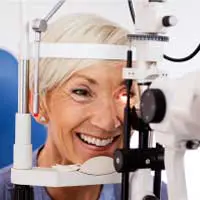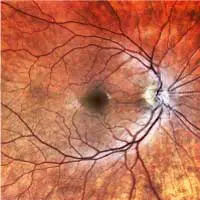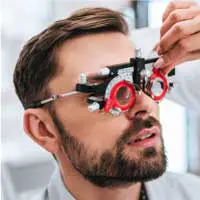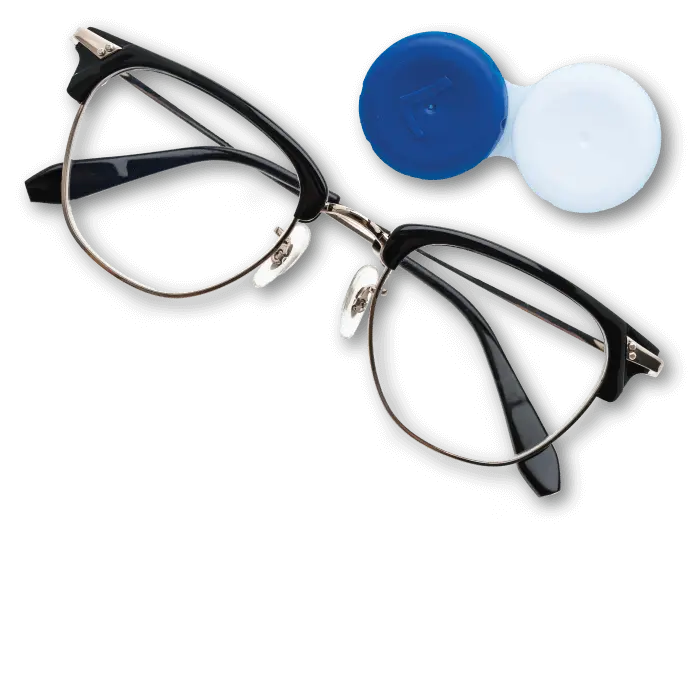Dr. Tania Mathews, Optometrist: Edmonton
Dr. Mathews moved to Edmonton when she was 3 years old and has been in Edmonton ever since. While doing her undergraduate at Macewan University, she got admission to Manipal University, a prestigious university in India. After completing her Optometry degree she worked in India for almost 2 years, helping people in rural communities, before coming back to Canada and completing the International Optometric Bridging Program in Waterloo as well as the Canadian Board exam in 2017. Dr. Mathews always enjoyed learning about the eye in school and learnt about the importance of eye exams from her family optometrist when she was younger. She has participated in many vision camps during her time in India, in rural areas which were very rewarding. One thing on her bucket list is to do a missions trip in the future if an opportunity comes up. She is a member of the Alberta Association of Optometrists, Alberta College of Optometrists and Canadian Association of Optometrists. In her spare time, she enjoys travelling and spending time with her family, husband and her mischievous Labradoodle.
How Our Optometrists in Edmonton Provide The Best Eye Care

Experienced Eye Doctors
Combined, our Edmonton eye doctors have 40+ years of experience. This means that they have cared for thousands of patients and treated every eye condition. This experience enables them to accurately diagnose and treat you.

Advanced Technology
Our Edmonton optometrists use the latest diagnostic technologies, such as digital retinal photography, OCT, corneal topography, and visual field analysis. These promote the early detection and treatment of eye disease.

Extensive Eye Exams
An essential ingredient to offering great care is time. With an exam duration upwards of 500% greater than elsewhere, and using modern diagnostic technologies, our Edmonton eye doctors offer one of the most thorough eye exams.
What is An Optometrist?
An optometrist (a.k.a. eye doctor) is a primary eye care provider who can conduct eye exams, write prescriptions, and treat eye diseases and disorders. Canadian optometrists require seven to eight years of training at a post-secondary institution before obtaining their professional designation as a Doctor of Optometry (also known as an OD). There are currently two schools of optometry in Canada: The University of Waterloo and the Université de Montréal. There are 20 additional optometry schools in the United States whose graduates are accredited to practice in Canada. Many optometrists also choose to do an extra year of residency (a type of internship) to specialize in a particular type of training or eye care field.
Optometry programs includes both didactic and clinical coursework in subjects such as anatomy, physiology, pharmacology, and optics. Optometrists are also required to complete a pre-determined number of supervised clinical hours before they can be licensed to practice.
In Canada, optometrists are overseen by provincial/territorial boards that ensure all qualifications are up to date. National tests are also administered by the Canadian Examiners in Optometry to ensure that OD training meets the high level of care expected by Canadian patients.

Our Optometrists in Edmonton provide the most advanced eye exams.
Our family-owned optometry clinic offers complete eye exams, specialty testing, prescription eyeglasses, sunglasses, safety glasses, contact lenses, designer frames and custom lenses. Visit the optometrists and opticians at our Edmonton clinic today and you will see how patient-first personalized eye care and eyewear enables you to be your very best.
Schedule An Exam View Our Services Our Optometrists
(780) 473-6123
Frequently Asked Questions
- Vision Services. Regular eye exams, dilated eye exams, vision therapy, and vision testing
- Prescribing Corrective Eyewear. Eyeglasses, reading glasses, prescription sunglasses, contact lenses, and scleral contact lenses.
- Fitting Contact Lenses. Soft contact lenses, hard contact Lenses, and scleral contact lenses.
- Diagnosing and Monitoring Eye Conditions. Related to systemic diseases such as diabetes, cancer, etc.
- Diagnosing and Managing Eye Conditions and Disease. This includes glaucoma, macular degeneration, cataracts, iritis, styes, and dry eyes.
- Prescribe oral and topical pharmaceutical medications. Examples include eye drops to treat glaucoma, dry eye disorder, and conjunctivitis (i.e., pink eye).
- Emergent Eye Care. Foreign body removal, corneal abrasions, etc.
Given that individuals only have two eyes, the importance vision is to quality life, livelihood, and lifestyle, and that once vision is lost it cannot be returned, we recommend that individuals get an optometrist-performed eye exam annually.
Annual eye exams are especially important for children and seniors, and for those individuals with systemic conditions, such as diabetes.
- Ages 0-18: Alberta Health Care covers one complete eye exam per year. Additional exams and/or treatments may be covered based on medical needs. Ask your doctor of optometry for information about coverage and potential costs for specific visual conditions. Alberta Health Care covers medically necessary services.
- Ages 19-64: Alberta Health Care does not cover eye exams, however many Albertans have insurance coverage through their employer or their own medical plan. We offer convenient direct-billing to most major health benefits plans. Alberta Health Care does cover medically necessary services.
- Age 65+: Alberta Health Care covers one complete eye exam per year. Additional exams and/or treatments may be covered based on medical needs, such as glaucoma, diabetes or cataract follow-up or monitoring. Ask your doctor of optometry for information about coverage and potential costs for specific visual conditions. Alberta Health Care covers medically necessary services.
- Medically Necessary/Urgent Care: includes eye infections or injuries, foreign objects in the eyes, sudden change in vision, monitoring for diabetes issues, glaucoma, and retinal disease, and post-operative care for cataract patients.
- Contact Information (name, address, phone number, email, etc.);
- Date of birth;
- Gender;
- Alberta Health Card;
- List of current prescription medicine(s);
- Medical history;
- Family Physician;
- Date of laser corrective eye surgery (if applicable);
- Ophthalmologist (if applicable);
- Health benefits/Health Insurance policy and group information;
- If applicable, your current prescription eyeglasses;
- If applicable, your current contact lens brand/type (i.e., packaging);
- The location of your most recent eye exam.






